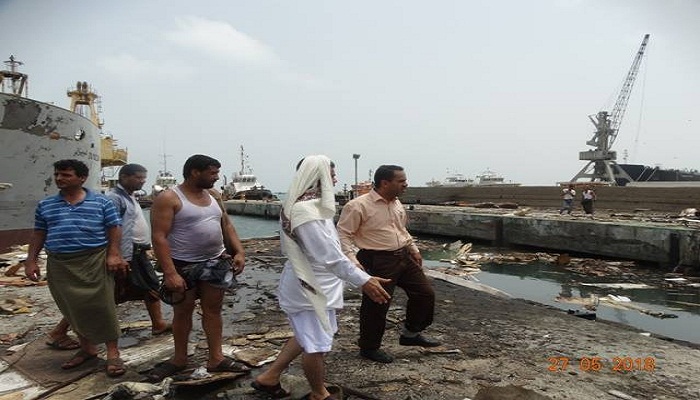Red Sea Ports Corporation`s losses amountes to one billion dollars
A.A
The deputy chairman of The Yemeni Red Sea Ports Corporation, Yahya Sharafuddin, said that the Ports Corporation’s losses amounted to one Billion dollars. ” the aggression sought during the past three years to eliminate the port by various means, causing the loss of 60 percent of the port operational capacity.” He added
Sharafuddin pointed out that the alliance of aggression imposed a further siege on the Yemeni people by booking relief vessels, tankers and commercial vessels and preventing them from entering the port of Hodeydah and diverting it to the port of Jizan, where the materials are damaged
He pointed out that one ship arrived at the port of Hodeydah carrying 581 containers belonging to the World Food Program .. “It is the only ship that arrived at the port, and a ship carrying flour arrived with the presence of a team of human rights experts of the United Nations, who was visiting the port to see the violations. The team ascended to the ship and the discovery that the amount of flour has been expired because of the long store, and was banned by the General Organization for Standardization, Metrology and Quality Control

Sharafuddin appealed to the local, foreign and international organizations to stand by the Yemeni people in the face of the abuse, aggression and siege that compounded the suffering of citizens
Earliest, Saudi-led Coalition launched a large-scale operation in the country’s western coastline Hodeida, which is home to Yemen’s only maritime container terminal and is the country’s fourth largest city. As a result, tens of thousands of people have displaced, escaping from front line , according to a statement of senior crisis response adviser at Amnesty International last week
Mark Lowcock, the UN emergency relief coordinator has expressed, in a statement read out to a Geneva briefing on Friday, concern over the decline of food imports to Yemen amid restrictions put in place by the Saudi regime
“I am particularly concerned about the recent decline of commercial food imports through the Red Sea ports said Mark Lowcock, warning that a further 10 million Yemenis could be at risk of starvation by the year’s end. Owcock said commercial food and fuel imports remained “well short of pre-blockade averages.”he added
“If conditions do not improve, a further 10 million people will fall into this category by the end of the year,” he warned. Confidence among commercial shippers has eroded due to delays, “including as a result of inspections undertaken by the Saudi-led coalition after these vessels have been cleared by UNVIM,” Lowcock said, referring to a UN verification system
On April 17, Amnesty International says intense fighting near Yemen’s largest port of Hudaydah has displaced tens of thousands of people, warning against the spread of clashes to urban areas
The rights group said on Thursday that “the worst could be yet to come” after surveying civilians who made the perilous escape from front line towns south of Hudaydah port
Saudi-backed militants are advancing towards the western province, which is under the control of Yemen’s popular Houthi Ansarullah movement
“The human impact of this fresh military offensive on Yemen’s western coastal areas is clear from the distressing stories shared by civilians displaced by the conflict,” Rawya Rageh, senior crisis response adviser at Amnesty International, said in a statement
Citing a report by the United Nations, the rights group said clashes along Yemen’s western coast have displaced around 100,000 people in recent months, most of them from Hudaydah Province
“It is a glimpse of what potentially lies in store on a wider scale if the fighting encroaches on the densely populated port city” it added
Amnesty said fleeing the fighting has been costly for those who could actually afford it
The vast majority of the displaced said “they could only fund the trip by selling precious belongings, such as wedding rings, property deeds and livestock
“They left on private buses and trucks, paying an average of 10,000 riyals (around £22 per person, a large amount in the local economy). In some cases, large families paid up to 150,000 riyals to escape,” it said
One woman from Qataba said she fled during fierce clashes, and while she managed to bring her infant and toddler daughters, she left behind her mother and seven-year-old son
“We left not thinking we would survive. We thought we would surely die… [but] by the end of it we hoped we died instead of going through what we went through,” she said

